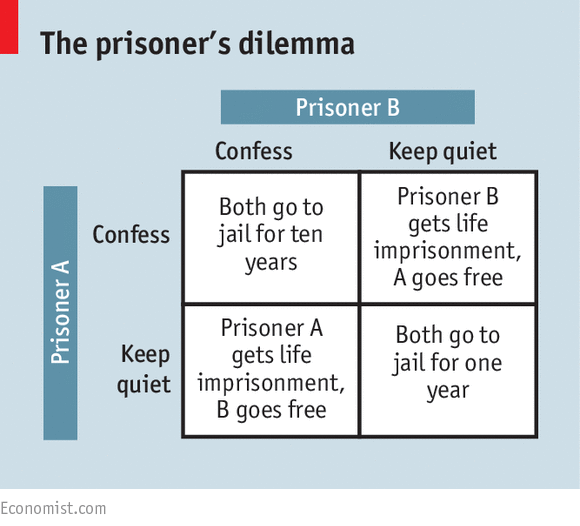We almost considered skipping Chapter 6 of Anarchy, State, and Utopia, since Nozick himself invites his readers to do so on p. 120: “The reader who wishes to pursue the main flow of our argument may proceed directly to the next chapter.” But as we have noted in so many of our previous posts, Nozick has left too many issues open and ends untied thus far, problems that he promises to tackle in Chapter 6. In addition, Nozick raises two excellent questions in the first subsection of Chapter 6 (pp. 120-125). First, Nozick asks what equilibrium is most likely to occur in a state of nature? To this end, he models the state of nature as a Prisoner’s Dilemma (see example below). According to Nozick, there are four possibilities in all:
Option A: You can join a protection association and allow your neighbors to join one.
Option B: You can join a protection association but prohibit your neighbors from joining one.
Option C: You can refuse to join a protection association but allow your neighbors to join one.
Option D: You can refuse to join a protection association and prohibit your neighbors from joining one.
Given these four possible moves, what course of action is most likely to occur? Nozick says “B” is the most likely outcome, but then he raises a second key question: if a private protection agency in the state of nature has a natural right to prohibit an independent from exercising his right of self-help against due-paying members of the agency (on the pretext that the guilt-finding procedures of independents are too risky), then, in anticipation of this sinister possibility (sinister from the independent’s point of view), why doesn’t the independent have the reciprocal right to preemptively prohibit his neighbors from joining a protection agency in the first place?
For our part, as we mentioned in a previous post, we are skeptical about Nozick’s premise that individuals (and, by extension, protection agencies on their behalf) have a natural right to prohibit others from exercising their rights of self-help. Nevertheless, assuming this premise were true, we would expect the existence of such a right to lead to a Hobbesian war of all against all, especially if Nozick is right about “B” being the equilibrium solution in the state of nature. We will delve deeper into Chapter 6 tomorrow!




Pingback: A Question for Nozick: Why Locke? | prior probability
Reblogged this on prior probability and commented:
Happy Kwanzaa! I am now resuming my in-depth review of Robert Nozick’s “Anarchy, State, and Utopia”, so let’s pick up where we left off: Chapter 6. That chapter has six subsections, and the post below — part 32 overall of my review — covers the first subsection of Ch. 6, where Nozick models the state of nature as a Prisoner’s Dilemma.